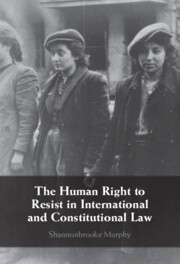Book contents
- The Human Right to Resist in International and Constitutional Law
- The Human Right to Resist in International and Constitutional Law
- Copyright page
- Dedication
- Contents
- Foreword
- Acknowledgments
- Table of Cases
- Table of Treaties and Legislation
- Table of Other Authorities
- 1 Introduction
- Part I The Concept
- Part II The Law
- 5 Domestic Provision in Constitutional Law
- 6 Recognition in General or Customary International Law
- 7 Provision in Treaty Law and Other International Codification
- 8 Conclusions and an Agenda for Reconsideration
- Bibliography
- Index
6 - Recognition in General or Customary International Law
from Part II - The Law
Published online by Cambridge University Press: 20 February 2025
- The Human Right to Resist in International and Constitutional Law
- The Human Right to Resist in International and Constitutional Law
- Copyright page
- Dedication
- Contents
- Foreword
- Acknowledgments
- Table of Cases
- Table of Treaties and Legislation
- Table of Other Authorities
- 1 Introduction
- Part I The Concept
- Part II The Law
- 5 Domestic Provision in Constitutional Law
- 6 Recognition in General or Customary International Law
- 7 Provision in Treaty Law and Other International Codification
- 8 Conclusions and an Agenda for Reconsideration
- Bibliography
- Index
Summary
This chapter addresses the status of recognition of the human right to resist in general or customary international law, and the problem of clarifying this absent express provision in material sources. It first considers theories of recognition in customary international law pre-dating the United Nations Charter, followed by theories of implied recognition under the Charter as a general principle of international law, including the generally accepted albeit narrow implied recognition of the right in UN General Assembly Resolution 2625. It then examines the possibility of a broader implied recognition of the right in the Universal Declaration of Human Rights. Applying the analytical template from Chapter 4, it identifies the elements and content of the theorized right in these sources. Finally, it reviews the third material source, the implied recognition of a customary right-duty to resist internationally criminal acts in the Nuremberg Principles. The chapter concludes by reviewing the corroborative sources potentially indicative of customary recognition, including: the customary laws of insurgency and belligerency, recognition, and responsibility; the regulation of ‘resistance movements’ and ‘national liberation movements’ by international humanitarian law; the political offence exception in extradition law; and the persistent non-equation of the ‘right to resist’ with ‘terrorism’ in international instruments.
Keywords
- Type
- Chapter
- Information
- Publisher: Cambridge University PressPrint publication year: 2025

